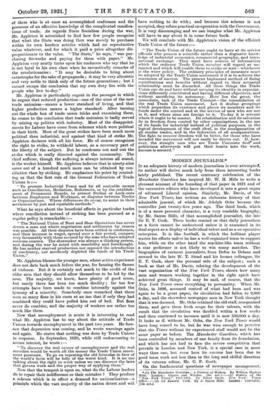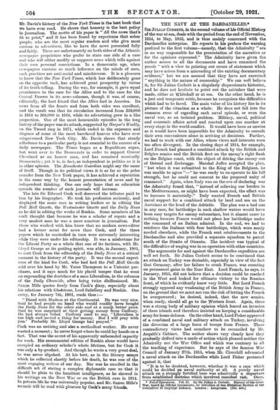MODERN JOURNALISM.*
IF an adequate history of modern journalism is ever attempted, its author will derive much help from three interesting books lately published. The recent centenary celebration of the Manchester Guardian has inspired Mr. W. H. Mills to write a pleasant account of the founding of that paper in 1821 and of the successive editors who have developed it into a great organ of advanced Liberal opinion. Similarly, Mr. Davis, of the New York Times, has written an elaborate history of that admirable journal, of which Mr. Adolph Ochs became the controller just twenty-five years ago. The third book, which is of a more personal character, is a very readable biography, by Mr. Saxon Mills, of that accomplished journalist, the late Sir E. T. Cook. These books remind us that daily journalism as a force cannot be understood unless it is examined in its dual aspect as a display of individual talent and as a co-operative enterprise. It is like football, in which the brilliant player wastes his efforts unless he has a well-organized team to support him, while on the other hand the machine-like team without a star performer is not likely to win many matches. The biographies of eminent journalists, from Defoe to Delano and onward to the late W. T. Stead and his former colleague, Sir E. T. Cook, show the personal side of the subject ; such a book as that of Mr. Davis, relating the development of the vast organization of the New York Times, shows how many men and women working together in the right spirit have achieved great things. It may be said, of course, that the New York Times owes everything to personality. When Mr. Ochs, in 1896, assumed control of what had been and was again to be a great paper, its circulation had fallen to 9,000 a day, and the shrewdest newspaper men in New York thought that it was doomed. Mr. Ochs retained the old staff, reorganized them, and gave them fresh scope for their talents, with the result that the circulation was doubled within a few weeks and then continued to increase until it is now 350,000 a day. It looks as if, without Mr. Ochs, the New York Times would have long ceased to be, but he was wise enough to perceive that the Times without its experienced staff would not be the same paper as before. The Manchester Guardian, which has been controlled by members of one family from its foundation, and which has not had to face the severe competition that prevails in London and New York, is a special case in more ways than one, but even hero its success has been due to good team work not less than to the long and skilful direction of its veteran editor, Mr. C. P. Scott.
On the fundamental questions of newspaper management,
• (1) The Manchester Guardian: a Century of History. By William Madam Mills. London: Chatto and Windt'. [8e. net.]---(2) History of the " New York Times," 1851-1921. By Elmer Davls. New York : Times OMce.—(3) Sir Edward Cook. By' J. Saxon Mills. London: Constable. [its. net.] Mr. Davis's history of the New York Times is the best book that we have ever read. He shows that honesty is the best policy in journalism. The motto of his paper is " All the news that's fit to print," and it has been found by experience that sober people, who are the most regular readers and who give most custom to advertisers, like to have the news presented fully
and fairly. There are unfortunately on both sides of the Atlantic newspaper proprietors who prefer to state one side of a case and who will either modify or suppress news which tells against their own personal convictions. In a democratic age, when newspapers exercise so much influence on the minds of men,
such practices are anti-social and mischievous. It is a pleasure to know that the New York Times, which has deliberately gone on the opposite tack, has achieved great prosperity by virtue
of its truth-telling. During the war, for example, it gave equal prominence to the case for the Allies and to the case for the Central Powers in its news columns, though it was, of course, editorially, the best friend that the Allies had in America. Its news from all the fronts and from both sides was excellent, and the result was that its circulation increased from 259,000 in 1914 to 368,000 in 1918, while its advertising grew in a like
proportion. One of the most honourable episodes in the long history of the paper was its attack, .supported by Harper's Weekly,
on the Tweed ring in 1871, which ended in the exposure and disgrace of some of the most barefaced knaves who have ever misgoverned New York City. Mr. Davis shows that steady
adhefence to a particular party is not essential to the success of a daily newspaper. The Times began as a Republican organ,
but went over to the Democrats in order to support Grover Cleveland as an honest man, and has remained nominally
Democratic ; yet it is, in fact, as independent in politics as it is in other spheres. The Manchester Guardian might say the same of itself. Though in its political views it is as far as the poles
asunder from the New York paper, it has achieved a reputation in the same way by the honest presentation of news and by independent thinking. One can only hope that as education spreads the number of such journals will increase.
The late Sir Edward Cook well deserved the tributes paid to him by his biographer. He took his profession seriously, and
displayed the same care in writing leaders or in editing the Pall Mall Gazelle, the Westminster Gazelle and the Daily News as he did in editing the works of Ruskin. Some members of his craft thought that because he was a scholar of repute and a very modest man he was a mere amateur in journalism. But those who worked with him know that no modern news-editor
bad a keener scent for news than Cook, and the three papers which he controlled in turn were extremely interesting while they were under his editorship. It was a misfortune for the Liberal Party as a whole that one of its factions, with Mr.
Lloyd George as its guiding spirit, was able, in January, 1901, to oust Cook from the editorship of the Daily News at a critical moment in the history of the party. It was the second experi- ence of the kind for Cook, who had had the Pall Mall Gazette sold over his head by Mr. Yates Thompson to a Unionist pur- chaser, and it says much for his placid temper that lie went on expounding the doctrines of a sane Liberalism, in the columns of the Daily Chronicle, after being twice disillusioned. Mr.
Saxon Mills quotes freely from Cook's diary, especially about his relations with Gladstone, Lord Salisbury and Ruskin. One entry, for January 7th, 1901, reads thus :—
" Dined with Hudson at the Continental. He was very nice. Said he had people on hand who would readily have bought the Daily News for the other side and at a much better price. Said he was surprised at their getting money from Cadbury. He had always failed. Cadbury used to say, Liberalism is too high and sacred a thing for money. But I will pray with you.' Probably Mr. Lloyd George had prayed."
Cook was an untiring and also a methodical worker. He never wasted a moment ; he never forgot where he could lay hands on a fact. That was the secret of his apparently unbounded capacity for work. His monumental edition of Ruskin alone would have occupied an ordinary scholar's whole lifetime, but for Cook it was only a by-product. And though he wrote a very greatdeal, he was never slipshod. At his best, as in the literary essays which he collected shortly before his death, he was one -of the most engaging writers of our day. Nor was he excelled in the
difficult art of stating a complex diplomatic case so that it should be plain to the humblest intelligence, as he showed in his writings on the Boer War or on the British case in 1914. In private life he was universally popular, and Mr. Saxon Mills's memoir will be read with pleasure by Cook's many friends.







































 Previous page
Previous page